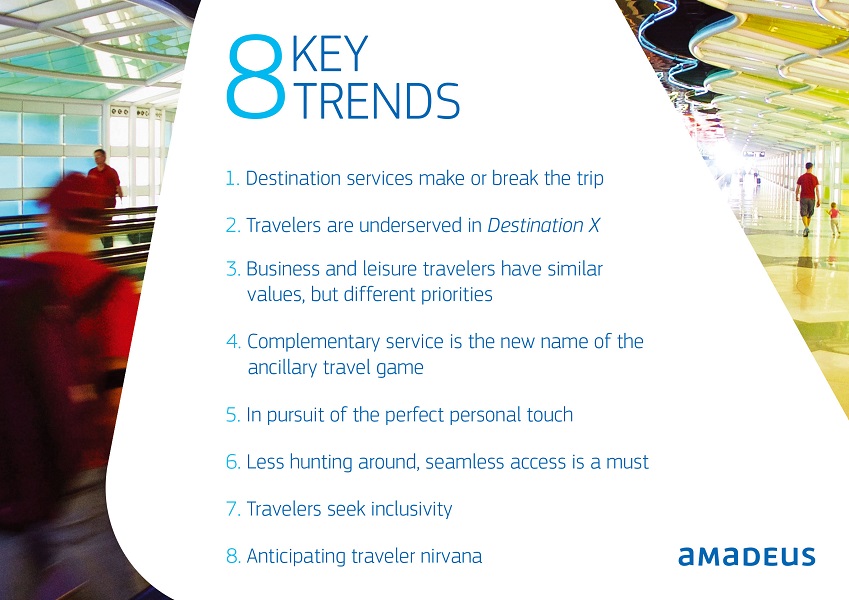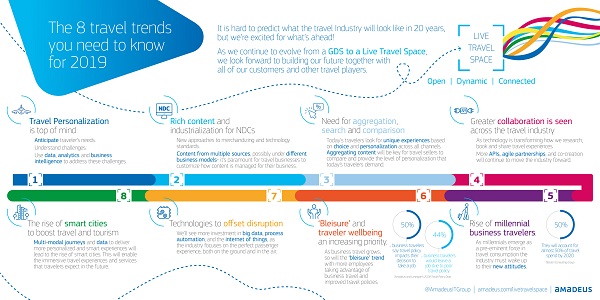Amadeus: The 8 travel trends you need to know for 2019
By Aliheydar_Rzayev Thursday, 23 May 2019 12:08 PM

The global travel industry is experiencing a fundamental change to the way in which travel is sold and how the traveler is served. At Amadeus, we actively observe travel trends so our customers and partners, and ourselves, can innovate and create better journeys for all.
As we continue to shape the future of travel in the long term, we’ve identified eight trends we’re looking at for 2019:
1. Personalization will remain a top priority for all areas of the travel industry
Whether you’re an airline, hotel, travel agent or travel manager, understanding how to better extract customer insights from data will remain key for success in 2019. More and more travelers now want a personalized experience. Companies that want to succeed must anticipate these traveler needs, understand previous challenges, and proactively address these challenges using data, analytics and business intelligence. Although some players have already improved the customer experience through significant investment in artificial intelligence and analytics, we’ve yet to see this applied at every step of the customer journey.
2. Continual rise of rich content, including NDC content
As the industry moves to embrace new approaches to merchandizing and technology standards, such as NDC, we’ll see the continual rise of rich content. 2019 is the year of industrialization for NDC with a number of enhanced solutions being deployed so airlines and travel sellers can offer and consume NDC content. This content will come from multiple sources, possibly under different business models, so it’s paramount for travel businesses to have the levers to decide and customize how that content is managed for their own business. Having access to a large breadth of rich content means travel sellers will have everything they need to personalize services to every traveler.
At Amadeus, one of the major developments in the coming year will be the continued evolution of the Amadeus Travel Platform which brings together airline, hotel, alternative lodging, rail, ground transport and in-destination content all in one place. This includes NDC content, which we are actively working on with airlines and travel sellers around the world through our NDC-X program.
3. Increased complexity raises need for aggregation, search and comparison
Today’s travelers are smart, tech-savvy consumers looking for unique experiences at the click of a button. They are demanding the same level of choice, personalized service and consistency across channels and devices so they can compare and choose the option of their liking. But with the complex myriad of possibilities, there is more of an opportunity for travel sellers to further help travelers create better journeys. They need the right tools that allow them to effectively compete and provide these desired journeys. So, in 2019, aggregating all this content will be key to ensuring travel sellers can easily compare and find exactly what they need so they can provide the level of personalization that travelers now demand.
4. Greater collaboration across the travel industry
Over the last decade, developments in technology have transformed the way in which we research, book and share travel experiences. New technologies and new ways to use them are popping up everywhere. To stay ahead of the curve and keep up with the demands and expectations of travelers, the travel industry must collaborate. In 2019, we’ll see more open APIs, more agile partnerships, and more co-creation to continue to move the industry forward. We’ve got some exciting developments and partnerships in the pipeline, so stay tuned.
 5. The rise of millennial business travelers
5. The rise of millennial business travelers
According to predictions by Boston Consulting Group, millennials will account for almost 50% of travel spend by 2020. Such figures underscore the necessity for travel industry players to learn how to accommodate the unique travel needs of millennials in order to harness this pool of potential profit. As millennials emerge as a pre-eminent force in travel consumption the industry must wake up to their new attitudes. This trend is top of mind for our business travel solutions like Amadeus cytric Travel & Expense.
6. Travel policies, including ‘bleisure’ and traveler wellbeing will become an increasingly important priority for travel managers
As business models become more global, business travel will continue to rise. According to GBTA, companies are expected to spend $1.7 trillion by 2022 to send their employees travelling around the world. As business travel grows, so will the ‘bleisure’ trend with more employees taking advantage of business travel and improved travel policies.
Additionally, business traveler wellbeing – the health, happiness and productivity of employees on the road – will be a top priority for travel managers in 2019. And for good reason. Amadeus and Lonergan’s 2018 Travel Policy Data found that 44% of business travelers would leave a job due to poor travel policy, while 50% say that a company’s travel policy would impact their decision to take a job.
As more businesses realize the importance of using travel policies as a tool for not only retaining but attracting staff, we can expect travel managers and HR to work more closely to prioritize traveler wellbeing.
 7. Travel players will deploy more technologies to offset potential disruption
7. Travel players will deploy more technologies to offset potential disruption
2019 will see the travel industry continuing to deploy a range of new technologies to improve efficiencies and minimize disruption. Improvements in technological capabilities will allow airports, airlines, hotels, travel sellers, and all other players to meet increasing traveler expectations. Investment in big data, process automation, internet of things, integration and fringe technologies will all be part of this move as the industry maintains its focus on the perfect passenger experience, both on the ground and in the air.
8. The rise of smart cities will boost travel and tourism
One of the trends that best consolidates the complexity and sophistication of the future consumer world is the rise of smart cities. The future of travel will be driven by multi-modal journeys and data to deliver more personalized and smart experiences. The rise of smart cities will boost travel and tourism. When done successfully, we believe that this will enable the immersive travel experiences and services that travelers expect in the future.
We are uniquely positioned in the travel industry to be at the heart of the development of smart cities and we have a task force run out of Asia Pacific dedicated to leading our smart initiatives.
It is hard to predict what the travel Industry will look like in 20 years, but we’re excited for what’s ahead! As we continue to evolve from a GDS to a Live Travel Space, we look forward to building our future together with all of our customers and other travel players.




























Add new comment